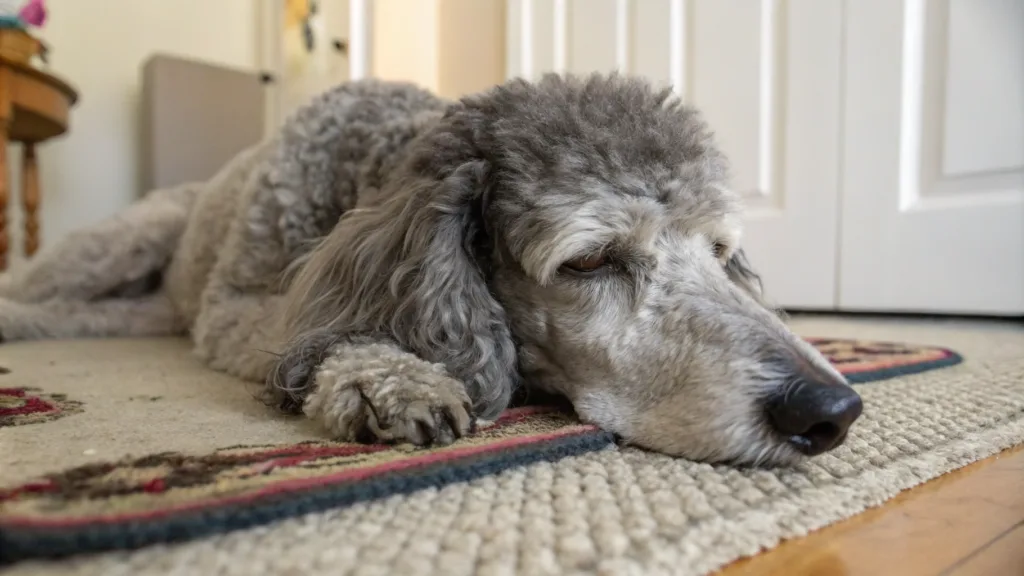How Long Do Poodles Live? Lifespan & Life Expectancy Insights

How long do Poodles live? You’ll find that Poodles typically live 11 to 15 years, with their lifespan varying by size. Toy and Miniature Poodles often enjoy longer lives, averaging 14 to 18 years, while Standard Poodles generally live around 12 years.
Your Poodle’s longevity depends on genetics, diet, exercise, and healthcare. Smaller Poodles tend to face fewer health complications and age more gracefully. Regular veterinary check-ups, balanced nutrition, and consistent exercise can help maximize your furry friend’s life expectancy.
If you’re curious about the nuanced factors influencing your Poodle’s health and potential lifespan, there’s much more to uncover.
Understanding Poodle Lifespan Basics

Throughout the dog world, Poodles stand out as a unique breed with remarkable longevity. When exploring poodle lifespan, you’ll discover that these intelligent dogs offer impressive life expectancy across their three main varieties: Standard, Miniature, and Toy Poodles.
The average lifespan for Poodles ranges from 11 to 15 years, with distinct variations among different sizes. Standard Poodles typically live around 12 years, while Miniature and Toy Poodles often enjoy longer lives, averaging 14 to 18 years. Size plays a vital role in determining life expectancy, with smaller Poodles generally living longer than their larger counterparts.
Each Poodle type brings unique characteristics to their longevity. Standard Poodles, standing 15+ inches tall and weighing 40-70 pounds, represent the largest variety.
Miniature Poodles, ranging 10-15 inches and weighing 10-15 pounds, offer a medium-sized option. Toy Poodles, less than 10 inches tall and weighing 4-6 pounds, provide the smallest and potentially longest-living variety.
Your Poodle’s lifespan isn’t just about genetics—it’s heavily influenced by care, diet, exercise, and regular veterinary check-ups. Factors like maintaining a healthy weight, providing mental stimulation, and addressing potential health issues early can greatly impact their overall life expectancy.
Understanding these nuances helps you provide the best care for your Poodle, potentially extending their years and ensuring a high quality of life throughout their remarkable journey with you.
Size Matters: Breed Variations and Average Lifespan

Standard Poodles, the largest variety, typically have a shorter lifespan ranging from 10-14 years. They’re more prone to age-related health complications due to their larger size.
In contrast, Miniature Poodles generally enjoy a longer life, averaging 14-17 years, with robust health and fewer significant medical challenges.
Toy Poodles represent the pinnacle of longevity among breed variations, often living 14-18 years. Their compact size contributes to their extended life expectancy, with fewer strain-related health issues compared to their larger counterparts.
You’ll notice that as Poodle size decreases, potential lifespan tends to increase.
These size-related differences stem from fundamental biological factors. Larger dogs age more rapidly, experiencing accelerated metabolic processes and increased susceptibility to age-related diseases.
Smaller Poodles benefit from slower aging mechanisms, allowing them to maintain vigor for extended periods.
When considering a Poodle, understanding these size-related longevity variations can help you make an informed decision.
Each breed variation offers unique characteristics, and your choice should align with your lifestyle, expectations, and ability to provide appropriate care throughout their potential lifespan.
Genetics and Health Influences That Affect Poodle Lives

Unravel the complex tapestry of Poodle genetics, and you’ll discover a vital landscape that profoundly influences their health and longevity.
As a pet parent, understanding these genetic factors can help you proactively manage your Poodle’s potential health challenges and possibly extend their poodle lifespan.
Genetics play a pivotal role in determining the breed’s susceptibility to specific health conditions. Inherited traits can predispose Poodles to various health issues, including hip dysplasia, eye disorders, and certain neurological problems.
While not every genetic condition guarantees illness, knowing your dog’s genetic background provides valuable insights into potential future health risks.
Responsible breeding practices greatly impact a Poodle’s genetic health. Reputable breeders conduct thorough genetic screenings to minimize the transmission of inherited diseases.
When selecting a Poodle, you’ll want to request health clearances and understand the lineage’s medical history to make an informed decision.
Different Poodle varieties exhibit varying genetic predispositions. Standard Poodles might face different health challenges compared to Toy or Miniature Poodles. For instance, larger Poodles are more prone to certain orthopedic issues, while smaller varieties might experience more neurological concerns.
Regular veterinary check-ups become essential in monitoring and managing potential genetic health issues. Early detection can greatly improve treatment outcomes and possibly extend your Poodle’s longevity.
Common Age-Related Health Challenges

As Poodles gracefully navigate their golden years, they’ll inevitably encounter a spectrum of age-related health challenges that can impact their quality of life. Understanding these potential health issues becomes essential for maintaining your Poodle’s well-being and potentially extending their poodle lifespan.
Each Poodle size variant experiences unique health challenges. Standard Poodles tend to face more substantial health risks, including increased susceptibility to cancer and gastrointestinal disorders. Miniature and toy Poodles often encounter neurological issues and are more prone to trauma-related complications.
Aging signs manifest differently across your Poodle’s lifespan. You’ll notice decreased mobility, vision impairments, and potential cognitive decline. Common health challenges include arthritis, which can greatly restrict movement, especially in larger Standard Poodles. Sensory deterioration becomes more pronounced, with hearing and vision gradually weakening.
Cardiovascular and metabolic changes accompany aging, increasing risks of heart disease and diabetes. Kidney and liver function might gradually decline, necessitating more frequent veterinary monitoring. Skin conditions and reduced immune responses can also emerge, making your Poodle more vulnerable to infections.
Neurological complications represent another vital concern. Seizures, cognitive dysfunction, and balance issues can develop, particularly in older Poodles. These leading causes of death underscore the importance of proactive healthcare and early intervention.
Managing these health challenges requires thorough veterinary care, tailored nutrition, gentle exercise, and consistent monitoring. By understanding and anticipating age-related health risks, you’ll help your Poodle maintain dignity and comfort throughout their senior years.
Maximizing Your Poodle’s Longevity Helping Them Live Longer

Critical elements for extending your Poodle’s longevity include:
- Feed your poodle a high-quality, age-appropriate balanced diet
- Schedule regular vet check-ups for early disease detection
- Maintain consistent daily exercise routines
- Address genetic predispositions through preventative care
- Provide mental stimulation and emotional support
Regular veterinary care plays a pivotal role in managing common health issues. Annual screenings can detect potential problems like hip dysplasia, eye disorders, and skin conditions before they become serious.
Your vet can provide tailored advice on nutrition and preventative treatments specific to your Poodle’s size and age.
A balanced diet is essential for maintaining ideal health. Choose high-quality dog food that meets your Poodle’s nutritional needs, considering their specific size variation—whether Toy, Miniature, or Standard.
Portion control and avoiding excessive treats can help prevent obesity, which contributes to numerous health complications.
Daily exercise isn’t just about physical fitness; it’s a thorough approach to wellness. Engage your Poodle in activities that challenge both body and mind.
Swimming, walking, and interactive play sessions can help maintain muscle tone, cardiovascular health, and mental sharpness.
Nutrition and Exercise Essentials For Poodle Dogs
A balanced diet forms the cornerstone of your Poodle’s health. Choose high-quality dog food specifically formulated for your Poodle’s size and age.
Toy, Miniature, and Standard Poodles have different nutritional requirements, so consult your veterinarian to develop a personalized feeding plan. Avoid overfeeding, as obesity can trigger numerous health issues and reduce longevity.
Regular exercise is equally critical in maintaining your Poodle’s well-being. Daily exercise prevents weight gain, supports cardiovascular health, and maintains muscle tone.
Aim for 60 minutes of physical activity tailored to your Poodle’s size and energy level. Walking, swimming, fetch, and agility training are excellent options that provide both physical and mental stimulation.
Remember that exercise intensity should match your Poodle’s age and physical condition. Puppies require gentler activities, while adult Poodles can handle more vigorous routines.
Monitor your dog’s response to exercise and adjust accordingly. Mental stimulation through training sessions and interactive toys complements physical activity, promoting overall health and potentially extending your Poodle’s longevity.
Consistent nutrition and exercise aren’t just habits—they’re your most powerful tools in ensuring a healthy, vibrant life for your beloved Poodle.
Recognizing Aging Signs Early

Every devoted Poodle owner should understand that recognizing early aging signs can greatly influence their dog’s quality of life and potential longevity. As your furry companion moves through different life stages, you’ll want to stay vigilant about subtle changes that might indicate the natural progression of aging.
Key indicators of aging in Poodles include:
- Decreased mobility and stiffness in joints
- Changes in vision or hearing capacity
- Reduced enthusiasm for daily exercise
- Increased sleeping patterns
- Cognitive shifts in behavior and response times
Your Poodle’s aging process isn’t just about physical transformations. It’s a complex interplay of health risks, routine checkups, and maintaining social connections. Noticing these changes early allows you to adapt your care strategy, ensuring your dog’s comfort and potentially extending their poodle lifespan.
Pay close attention to how your dog moves, interacts, and responds to familiar stimuli. Slower walking, hesitation on stairs, or seeming disoriented can signal age-related challenges.
A balanced diet becomes increasingly vital, helping manage weight and supporting overall health during these changes.
Regular veterinary consultations are essential. Your vet can help differentiate between normal aging and potential health concerns, providing targeted interventions.
Don’t underestimate the power of mental stimulation and continued social engagement, which can greatly influence your Poodle’s well-being.
Care Strategies for Senior Poodles

| Age Range | Physical Needs | Mental Stimulation |
|---|---|---|
| 10-12 years | Reduced mobility | Gentle interactive games |
| 13-15 years | Low-impact exercise | Puzzle toys and short training |
| 16+ years | Assisted movement | Calm companionship |
| Senior Stage | Specialized diet | Memory-supporting activities |
Senior Poodles require a thorough approach to health management. Routine checkups become increasingly important, allowing veterinarians to monitor and address emerging health issues promptly.
Your dog’s exercise requirements will naturally diminish, so adapt activities to match their reduced energy levels. Opt for shorter, gentler walks and low-impact movements that maintain muscle tone without causing strain.
A balanced diet tailored to senior nutritional needs is essential. Choose high-quality, age-appropriate dog food that supports joint health and addresses potential metabolic changes. Supplement their diet with veterinarian-recommended nutrients that support cognitive function and overall health.
Maintaining social connections remains crucial for senior Poodles. Gentle interactions with family members, calm play sessions, and consistent affection can greatly improve their mental well-being. Be attentive to subtle changes in behavior, mobility, or appetite, as these might indicate underlying health concerns requiring immediate professional evaluation.
Conclusion
By understanding your Poodle’s unique health needs, you’ll help them live their best life. Whether you’ve got a Toy or Standard Poodle, proactive care makes all the difference. Regular vet check-ups, balanced nutrition, and lots of love can extend your furry friend’s years. Cherish every moment, stay attentive to their changing needs, and you’ll maximize the precious time you have together.
FAQ: How Long Do Poodles Live?
The average life expectancy of a poodle breed generally ranges from 12 to 15 years. However, this can vary depending on the specific type of poodle and how well they are cared for. Toy and Miniature poodles usually have a slightly longer life span compared to Standard poodles.
To ensure your poodle lives a long and healthy life, it is important to provide a balanced diet, regular exercise, routine veterinary check-ups, and mental stimulation. Additionally, consider investing in pet health insurance to cover unexpected medical expenses.
Several factors can affect how long a poodle will live, including genetics, diet, exercise, and overall health care. Poodles are prone to certain genetic health issues, so regular vet visits and early detection of potential problems are key to extending their life span.
Yes, poodles usually live longer than many other breeds due to their smaller size and careful breeding practices. They are known for their intelligence and adaptability, which can contribute to a long life.
Yes, there are differences in life span among the types of poodles. Toy and Miniature poodles tend to have a longer average life expectancy than Standard poodles. This is often due to the smaller size and lower risk of certain health issues.
To keep your poodle happy and healthy, provide regular exercise, mental stimulation, a nutritious diet, and plenty of love and attention. Regular grooming is also essential.






